As countries restart, WHO warns about lack of virus tracing
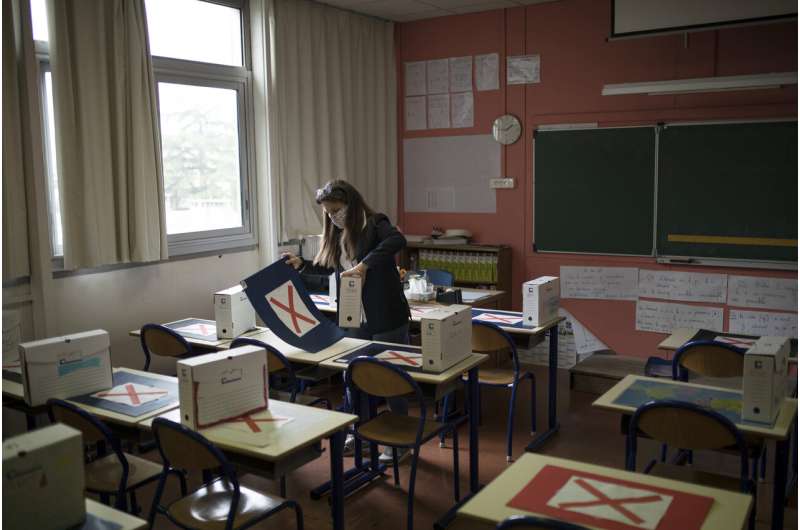
A top world health official Monday warned that countries are essentially driving blind in reopening their economies without setting up strong contact tracing to beat back flare-ups of the coronavirus.
The warning came as France and Belgium emerged from lockdowns, the Netherlands sent children back to school, and many U.S. states pressed ahead with the lifting of business restrictions.
Authorities have cautioned that the scourge could come back with a vengeance without widespread testing and tracing of infected people's contacts with others.
In fact, fears of infection spikes in countries that have loosened up were borne out in recent days in Germany, where new clusters were linked to three slaughterhouses; Wuhan, the Chinese city where the crisis started; and South Korea, where a single nightclub customer was linked to 85 new cases.
The World Health Organization's emergencies chief, Dr. Michael Ryan, said that robust contact tracing measures adopted by Germany and South Korea provide hope that those countries can detect and stop virus clusters before they get out of control. But he said the same is not true of other nations exiting their lockdowns, declining to name specific countries.
"Shutting your eyes and trying to drive through this blind is about as silly an equation as I've seen," Ryan said. "And I'm really concerned that certain countries are setting themselves up for some seriously blind driving over the next few months."

Worldwide, the virus has infected a confirmed 4.1 million people and killed more than 280,000, including over 150,000 in Europe and about 80,000 in the U.S., according to a tally by Johns Hopkins University. Experts believe those numbers understate the true toll of the outbreak.
More than 10,000 people are involved in contact tracing in Germany, a country of 83 million, or about one-quarter the size of the United States. Other nations are behind.
Britain, for example, abandoned an initial contact-tracing effort in March when the virus's rapid spread made it impossible. Now it is recruiting 18,000 people to do the legwork.
France's health minister has for weeks promised robust contact tracing and pledged the country would test 700,000 people per week. On Monday, with progress on those efforts unclear, the nation's highest court ordered the government to take extreme care in protecting the right to privacy, casting doubt on how to proceed.
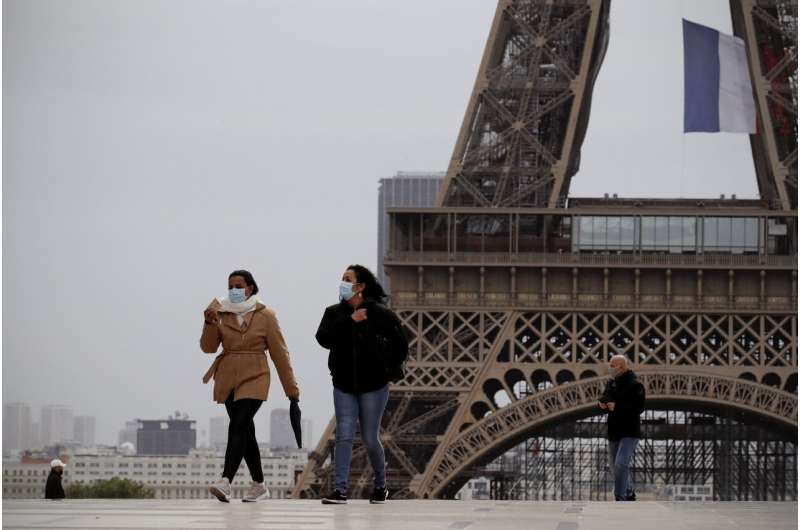
In the U.S., where health officials will be watching closely in the coming days for any resurgence of the virus two weeks after states began gradually reopening, contact tracing is a patchwork of approaches and readiness levels. States are scrambling to hire and train contact tracers, with experts saying the U.S. will need to bring on hundreds of thousands of them.
Apple, Google and a number of U.S. states, as well as European countries, are working to develop contact-tracing apps that can show whether someone has crossed paths with an infected person. But experts say the technology can only supplement, not replace, the labor-intensive human work.
Massachusetts is training more than 1,000 contact tracers aided by software. In the hardest-hit corner of the U.S., New York, contact tracers began online training Monday, and Gov. Andrew Cuomo said some upstate areas, including the Finger Lakes, can ease their restrictions after Friday.

The governor set a requirement of 30 contact tracers per 100,000 residents for areas to reopen. That translates to about 6,000 workers statewide, performing what Cuomo described as "a logistical nightmare, never been done before."
Meantime, a new study indicates that New York City's death toll from the coronavirus may be thousands of fatalities worse than the official tally.
Between mid-March and early May, about 24,000 more people died in the city than researchers would ordinarily expect that time of year, according to a Centers for Disease Control and Prevention analysis. That is about 5,300 more deaths than previously attributed to the virus during that period.
Those "excess deaths" could have been caused indirectly by the outbreak, in some cases by swamping the health care system and delaying lifesaving care for other health problems, the report said.
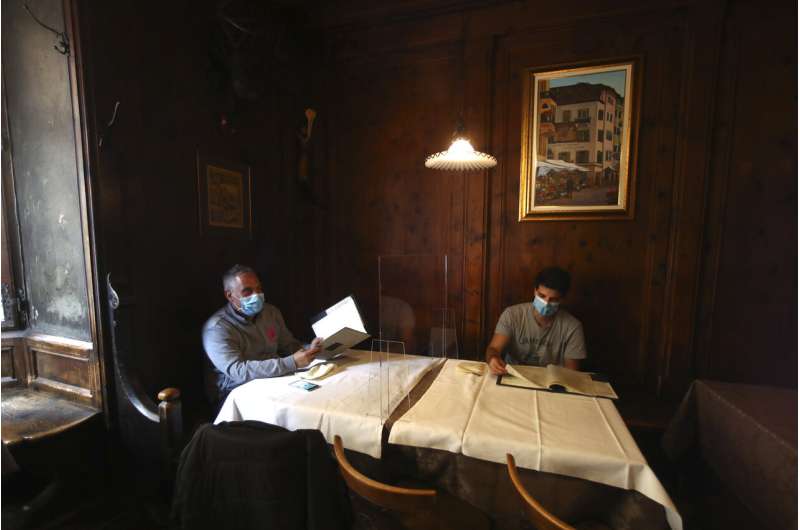
Another new CDC report showed how difficult and time-consuming it is to track virus cases. The analysis of California efforts in the early days of the U.S. outbreak found that contacting travelers from China and Iran consumed nearly 1,700 hours of time by local authorities and still didn't stop the virus from entering the state.
In loosening up their country's lockdown, German authorities have spelled out a specific level of infection that could lead to the reimposition of restrictions in local areas. Other countries—and U.S. states—have been vague about what would be enough to trigger another clampdown.
With Monday's partial reopening in France, c rowds formed at some Paris Metro stations, but the city's notorious traffic jams were absent. Only half the stores on the Champs-Elysees were open.
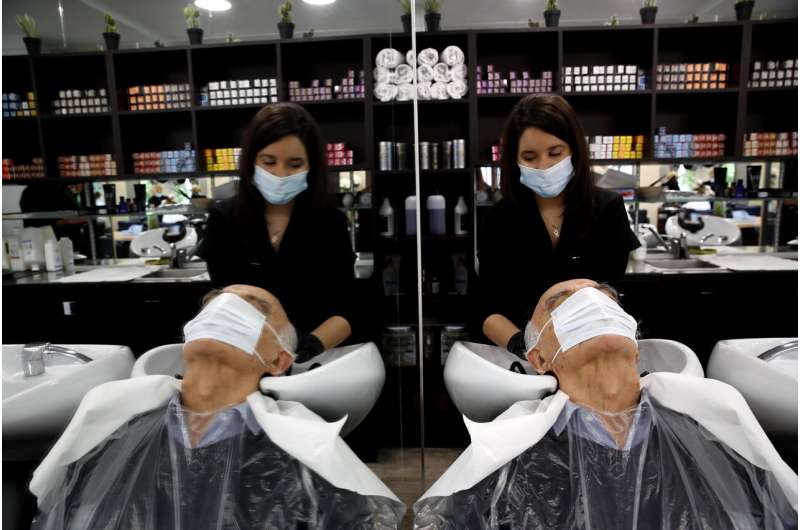
Parisian hairdressers planned to charge a fee for the disposable protective gear they will have to give customers. Walk-ins will be a thing of the past, said Brigitte L'Hoste, manager of the Hair de Beauté salon.
"The face of beauty will change, meaning clients won't come here to relax. Clients will come because they need to," said Aurelie Bollini, a beautician at the salon. "They will come and aim at getting the maximum done in the shortest time possible."
Across the Atlantic, hair salons in Florida contended with tight regulations and pent-up demand as they reopened across much of the state, save for some hard-hit areas. The Fringe Salon in Naples was already booked for the entire week, its capacity limited by the social-distancing rules.
"It's just pure chaos. Everybody's excited about getting their haircut," said owner Trish Boettcher.

Quarantines reached into the offices of two U.S. governors. Illinois Gov. J.B. Pritzker joined his entire staff in working from home after a top aide tested positive for COVID-19. The state recorded nearly 800 deaths in the seven days ending Sunday, making it Illinois' deadliest week yet. Meanwhile, Iowa's Gov. Kim Reynolds began a partial quarantine.
In South Korea, the government clamped down again, halting school reopenings planned for this week and reimposing restrictions on nightclubs and bars. It is trying to track down 5,500 patrons of a Seoul nightlife district through credit-card transactions, cellphone records and security footage.
Roughly half of Spain's 47 million people shifted into looser restrictions, beginning to socialize, shop in small stores and sit outdoors at restaurants. Its biggest cities, Madrid and Barcelona, remained under lockdown.
-
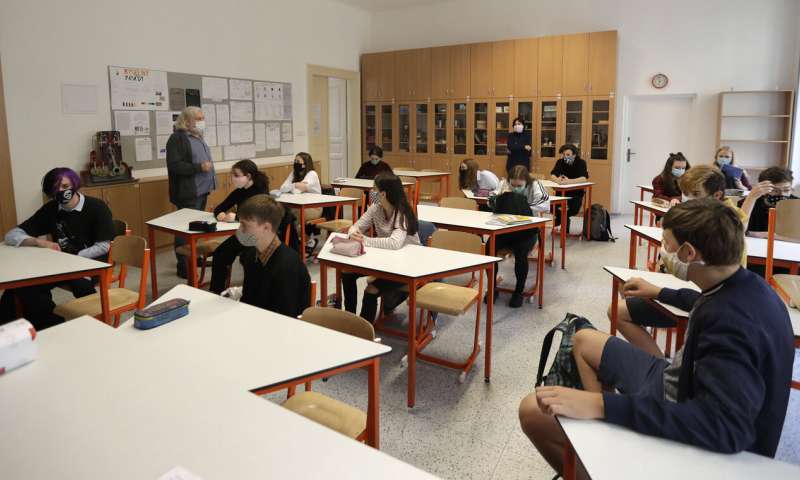
9th grade students listen to instructions at an elementary school in Prague, Czech Republic, Monday, May 11, 2020. At elementary schools, those students who are preparing for an entrance exam at high schools can return to schools in voluntary classes no bigger than 15 as the Czech Republic is taking a step to normalcy amid the coronavirus pandemic by easing more restrictions adopted by the government to contain it. (AP Photo/Petr David Josek) -
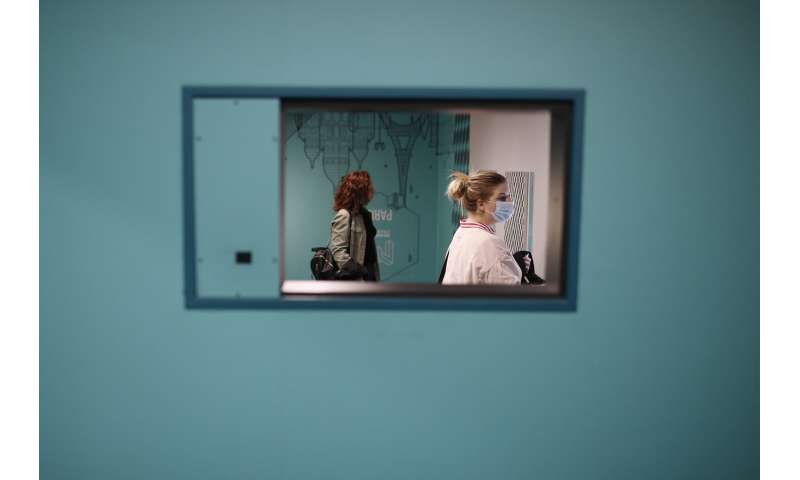
Visitors look at artwork at the Illusion museum Monday, May 11, 2020 in Paris. The French began leaving their homes and apartments Monday for the first time in two months without permission slips as the country began cautiously lifting its virus lockdown. Small museums are allowed to reopen Monday if respecting the protective measures. (AP Photo/Rafael Yaghobzadeh) -
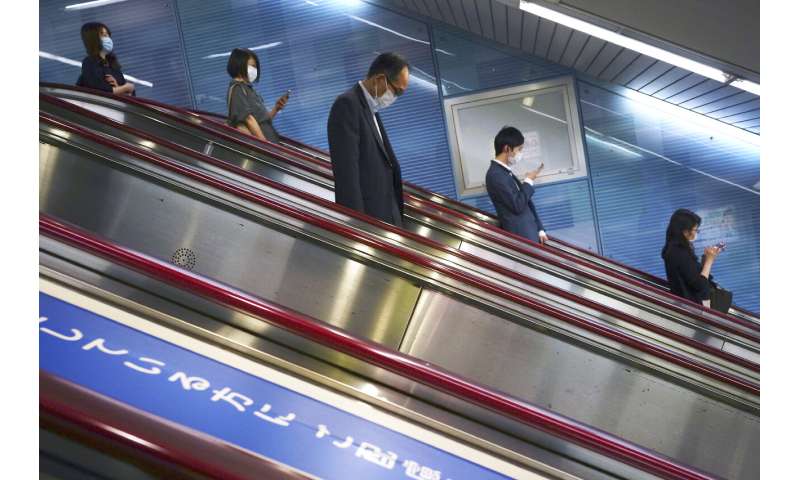
People wearing face masks to help curb the spread of the coronavirus ride an escalator into a subway station in Tokyo Monday, May 11, 2020. Japan has extended a state of emergency until the end of May. (AP Photo/Eugene Hoshiko) -
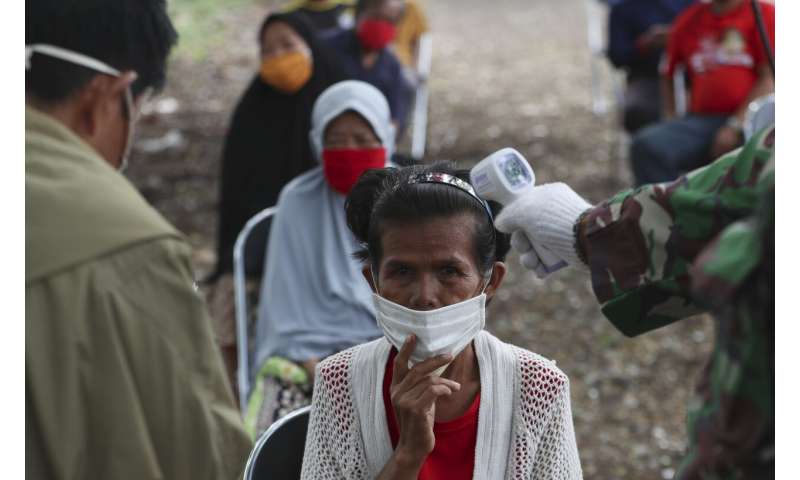
A soldier takes the body temperature of residents as they queue for free rice provided by the government for those whose livelihoods are affected by the new coronavirus outbreak, at the Central Jakarta Military District Command, in Jakarta, Indonesia, Monday, May 11, 2020. (AP Photo/Achmad Ibrahim) -
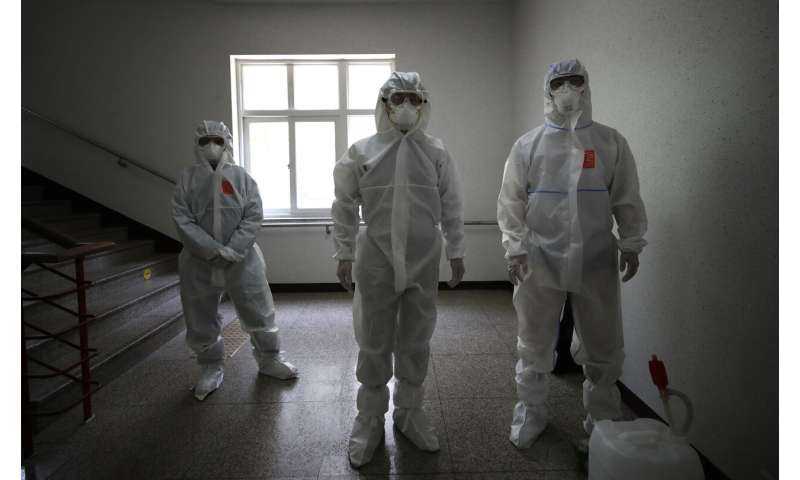
Health officials wearing protective gear prepare to spray disinfectant to help reduce the spread the new coronavirus ahead of school reopening in a cafeteria at a high school in Seoul, South Korea, Monday, May 11, 2020. (AP Photo/Lee Jin-man) -

People exercise in a fitness studio in Cologne, Germany, Monday, May 11, 2020 . In German federal state North Rhine Westphalia first gyms have reopened after coronavirus lockdown. (Marius Becker/dpa via AP) -
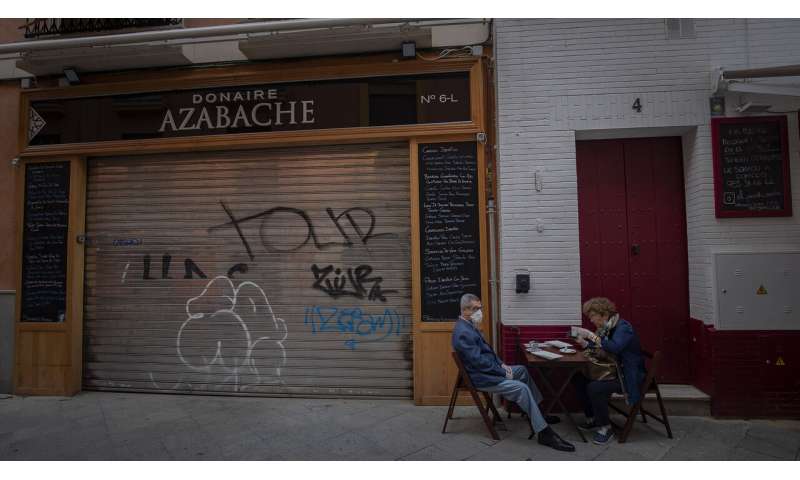
Two people sit in a terrace bar in Seville, Spain, Monday, May 11, 2020. Roughly half of 47 million Spaniards are stepping into a softer version of the country's coronavirus strict confinement and are beginning to socialize, shop in small establishments and enjoy a meal or a coffee in restaurants and bars with outdoor seating. The hard-hit region around the Spanish capital, Madrid, and the economic powerhouse of Barcelona, in the northeastern Catalonia region, are among those territories that remain under stricter measures. (AP Photo/Miguel Morenatti) -
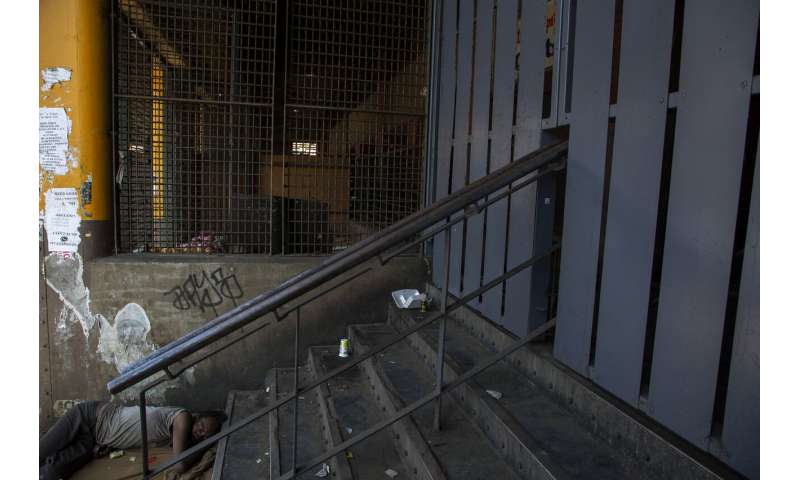
A homeless man sleeps on sidewalk in downtown Johannesburg, South Africa, Monday, May 11, 2020. (AP Photo/Themba Hadebe) -
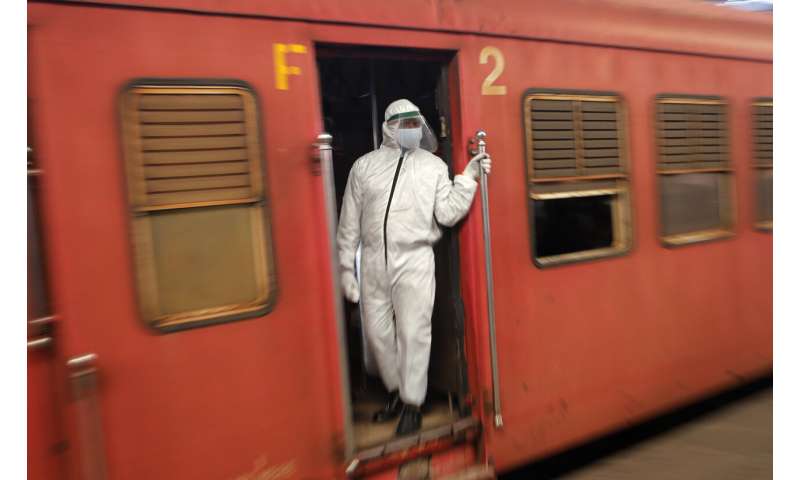
A Sri Lankan railway worker in hazmat suit travels in a train coach in Colombo, Sri Lanka, Monday, May 11, 2020. Sri Lanka's government asked state and private sector workers to resume work Monday after a nearly two-month coronavirus lockdown. (AP Photo/Eranga Jayawardena)
British Prime Minister Boris Johnson announced a modest easing of the country's lockdown but urged citizens not to squander the progress made. Some people, however, were confused as the government shifted its slogan from "Stay at Home" to "Stay Alert." Scotland, Wales and Northern Ireland stuck with the old motto.
India reported its biggest daily increase in cases even as it prepared to resume train service.
In South Africa, authorities in Cape Town and the surrounding province considered reimposing restrictions because the area has become a hot spot accounting for about half the country's 200 virus deaths.
© 2020 The Associated Press. All rights reserved. This material may not be published, broadcast, rewritten or redistributed without permission.


















